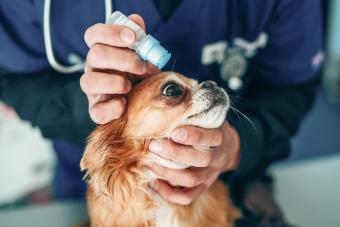
Dogs can get an eye condition called conjunctivitis, also known as pink eye. If your dog has red, puffy eyes, if you notice a puss-like, clear or milky discharge coming from your dog's eyes, or if your dog is blinking abnormally, they might have this condition. It's a very common problem, and it affects the inside of the eyelids and the membranes that cover and protect your dog's eyes. Treatment typically involves using medicated eye drops prescribed by your veterinarian, though other interventions may be necessary, depending on the cause of pink eye in your dog.
Causes of Pink Eye in Dogs
Conjunctivitis is an inflammation of the eye. Specifically, it is the inflammation of the conjunctiva, which are the membranes that cover and protect your dog's eyes. Conjunctivitis in dogs is caused by various types of bacteria, viruses, fungi, allergies, and even dry eyes. Airborne irritants such as dust, pollen, mildew, dander, perfume, or cosmetics, and smoke can also cause pink eye in dogs. Pink eye can also develop as a result of trauma or injury to the eye.
Symptoms

The symptoms of conjunctivitis in dogs are what you would typically associate with conjunctivitis in humans. You might see one or more of the following:
- Redness
- Itching
- Crusting/scabbing around the eyelid or outer corner of the eye
- Light sensitivity (squinting)
- Watery discharge (sometimes pus-like)
- Swelling
Diagnosis
When you arrive at the clinic, your veterinarian will perform a physical examination. They check to see if your dog is blinking or squinting excessively. They may use an anesthetic eye drop solution to numb the eye and make the dog feel more comfortable during the examination. The vet also checks for foreign objects that could contribute to the development of pink eye.
Pink eye can be a secondary condition caused by another type of illness, as well. Dogs who have some type of respiratory infection, for example, can develop pink eye. In these cases, the veterinarian will treat both conditions.
In other causes, corneal ulcers may cause pink eye in dogs. To diagnose corneal ulcers, an orange dye known as fluorescein is put into the eye to allow the veterinarian to check the eyes properly under blue light.
To obtain a thorough diagnosis, veterinarians conduct a full examination of the dog's eyes before prescribing any type of medication. That's why it's critical to go to your veterinarian if you suspect something may be wrong. Different causes of pink eye require different types of treatment.
Treatment

The symptoms of pink eye caused by an infection are similar to other forms of conjunctivitis, so the treatment is also similar. This includes topical antibiotic ointments, which should be applied to the affected eyes every 6 to 8 hours for 10 to 14 days. If symptoms persist or worsen, your dog may need an oral antibiotic or steroid medication. If your dog has corneal ulcers that have not healed in 2 to 3 days after getting appropriate treatment, they may need surgery.
Risk of Spread
Pink eye is extremely contagious and can spread through contact with an infected dog. It can also be transferred via contaminated objects, such as towels, water bowls, food dishes, and can even infect humans, who can then spread the disease further. Keep your dog's environment clean to help reduce the risk of any secondary infections or complications. While it's rare that you'll develop conjunctivitis from your dog, it's conceivable if your dog's eye problem is caused by a parasite like roundworms.
When to Call the Vet

If you notice any of the above symptoms, or your dog begins to show signs of eye irritation, you should contact your veterinarian for a consultation. Any changes in your dog's vision could be an indication of swelling in the tissue behind the eyeball (or retina). If this happens, contact your veterinarian as soon as possible to obtain an emergency consultation.
Don't Forget to Be Gentle
While you wait for the vet, you can clean the area. Wipe away build-up with a clean cloth moistened in lukewarm water. Never scrape the infected region with your finger or other harsh objects, as this could result in significant damage. Applying a cold compress to your dog's eye will also help ease the inflammation. Visit your veterinarian as soon as you suspect pink eye. Don't wait, as it could result in permanent damage to the eye regardless of the cause.







